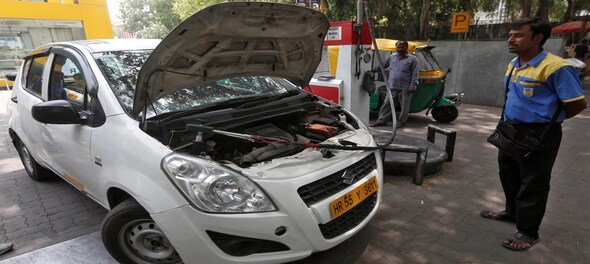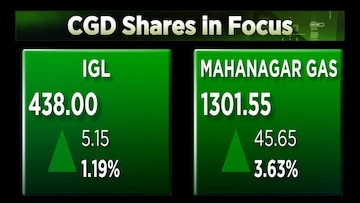
The number of new vehicles that run on compressed natural gas (CNG) hitting Indian roads has more than doubled to 75,000 units a month, compared to 35,000–40,000 monthly additions in the pre-pandemic era.
However, most CNG vehicles sold are cars, where Maruti Suzuki is a dominant player.
The sales of commercial CNG vehicles, like trucks, buses, and autorickshaws, are slowing down in India. "While CNG vehicle additions look strong optically, there is a slowdown in the conversion of high-usage vehicles. The addition of CNG buses is particularly slow, and in areas such as Delhi/Mumbai, incremental bus addition is majorly EV (electric vehicle) buses," said Kotak Institutional Equities in a recent report.
The falling sale of CNG trucks and buses is bad news for fuel producers like Indraprastha Gas and Mahanagar Gas. Commercial vehicles tend to consume more fuel than cars.
Based on this premise, the Mumbai-based broking firm has downgraded both gas distribution companies.

In the past two years, many commercial vehicles, particularly light goods vehicles, have seen a switch to CNG as diesel vehicles became more expensive after the rollout of the new emission norms called Bharat Stage-VI (BS VI).
That trend seems to be reversing now as the adoption of electric vehicles gains pace.
Mumbai has added 900 electric buses, and Delhi has bought 1,100 in the last three years. By 2025, Mumbai plans to add 2,400 electric buses, and the Delhi government plans to electrify 80% of its fleet.
Three-wheelers, like autorickshaws, are also turning electric in most Indian metro cities except Mumbai. So, the sale of CNG three-wheelers has already declined, according to Kotak.
"With frozen petrol and diesel prices (while CNG prices have firmed up), unless legally mandated (like in Delhi), taxi and fleet operators would not be keen to have CNG options," the report opined.
As of January 18, the fuel price in Delhi is ₹96.76 per litre for petrol, ₹89.66 per litre for diesel, ₹76.59 per kg for CNG.
CNG vehicles aren't as cheap as they used to be compared to an EV or one that runs on petrol. To prove its point, the report compared a Tata Tiago XT EV against its CNG (XT) and petrol (XTA) variants.
Breakeven calculation for Tata Tiago EV and CNG variants
| Tata Tiago XT EV | Tata Tiago XT CNG | Tata Tiago XTA Petrol | |
| On-road price in Rs | 1,075,865 | 891,144 | 781,872 |
| Incentives | 120,000 | NA | NA |
| Cost to consumer in Rs | 955,865 | 891,144 | 781,872 |
| Rs/kWH or Rs/Kg or Rs/litre | 8 | 77 | 97 |
| Mileage (km/unit) | 205 | 20 | 14 |
| Running cost (Rs/km) | 1 | 3.9 | 6.8 |
| Breakeven distance versus petrol in km | 29,744 | 37,271 | NA |
| Breakeven distance versus CNG in km | 22,181 | NA | NA |
Source: Companies, Kotak Institutional Equities estimates
It notes that the EV (priced at ₹955,865 as the cost to the consumer) can achieve breakeven in 22,181 kilometres against the CNG variant (priced at ₹891,144) and at 30,000 km against the petrol (priced at ₹781,872) variant. The running cost for EV per km comes at ₹0.9 against ₹3.9 for CNG and ₹6.8 for petrol. Kotak Securities has downgraded IGL to sell with a revised fair value of ₹90, while MGL's FV is pegged at ₹1,050.
The researchers have assumed 65% of the quoted range for EV and 75% of the quoted range for CNG/Petrol. Also, they have added ₹65,000 to the CNG variant for a like-for-like comparison with automatic and assumed ₹5,000/KWh in incentives for EV.
(Edited by : Sriram Iyer)
First Published: Jan 18, 2024 3:00 PM IST
Check out our in-depth Market Coverage, Business News & get real-time Stock Market Updates on CNBC-TV18. Also, Watch our channels CNBC-TV18, CNBC Awaaz and CNBC Bajar Live on-the-go!


BJP replaces Poonam Mahajan with lawyer Ujjwal Nikam for Mumbai North Central Lok Sabha seat
Apr 27, 2024 7:53 PM
Meet Amritpal Singh, the separatist leader contesting Lok Sabha polls from Punjab's Khadoor Sahib
Apr 27, 2024 7:18 PM

